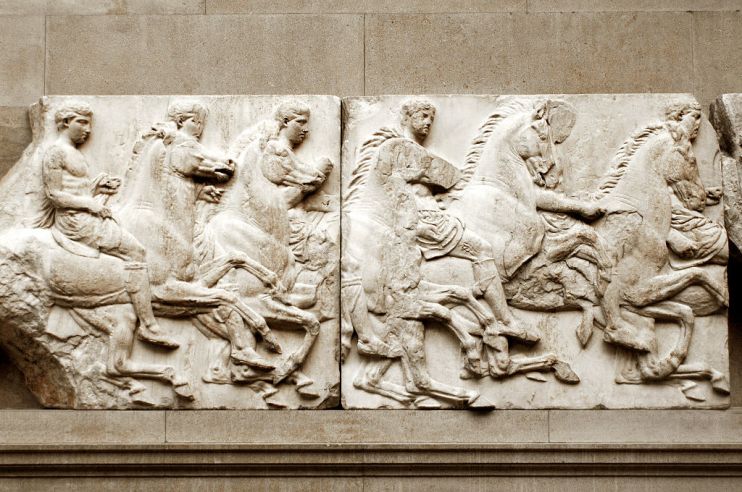The Debate: Should Britain return the Parthenon Sculptures to Greece?

City A.M.’s weekly feature takes the fiercest water-cooler debates and pits two candidates head to head before delivering The Judge’s ultimate verdict. This week we tackle the Parthenon Sculptures. Should Britain return them to Greece?
Yes: In return for sending back the Parthenon Sculptures we could receive other blockbuster Greek artefacts

Both Britain and Greece stand to gain from a sensible, pragmatic resolution on this matter and it has significant public support, including amongst Conservative voters, Brexit supporters and in every region of the UK.
But there is a way forward in this debate that would bring huge cultural benefits to both the UK and Greece. Both sides are moving away from the circuitous debates of the past, agreeing to disagree on the issue of ownership and looking instead to a collaborative future. An imaginative deal, deliverable within the current legal framework, could see the Sculptures reunified in Athens whilst other blockbuster Greek artefacts are sent to the British Museum for exhibition. This also presents an opportunity to establish a Foundation that would raise funds for cultural and educational opportunities for young people in both countries, and to support the reimagination of the British Museum’s Duveen Gallery into a cutting-edge, contemporary Hellenic Gallery.
The Labour Party has made clear that the Parthenon Sculptures remain a matter for the British Museum. This was the government’s longstanding position until this week. Labour has now said it would not stand in the way of a deal that is achievable under the law. This is in line with the views of the British public who not only do not oppose the return of the Sculptures, but overwhelmingly support the notion of establishing cultural partnerships.
Any government would do well not to obstruct a deal that would benefit this country – helping to breathe new life into the wonderful British Museum whilst refreshing the cultural scene in the UK for the next generation.
No: The sculptures tell the story of Britain and that’s why they belong in the British Museum

It was A Greek, Aristotle, who said that “between friendship and truth, you should always prefer truth”. And the time comes when you must stick to your principles and make unpopular choices. This is not about art; it is about defending the rule of law and the sovereignty of parliament.
A parliament that decided twice, through a Select Committee and then a House of Commons vote (won 82 to 30), that the Elgin Marbles were lawfully acquired. The tireless work of historians worldwide has uncovered plenty of documents and eyewitness testimonies to confirm and prove, beyond reasonable doubt, the marbles are ours.
But even so, can we not just be the bigger person and send them back?
If they were unimportant to us, yes. But in their long history in the British Museum, these sculptures have shaped how we (and the entire Western culture) think about the ancient world, moving away from the neoclassical period’s idealised perfection to the romantics’ rugged realism. Their lasting impact is apparent around London and the country at large; just look at the frieze of the Atheneum Club or the porches of the Church of St Pancras at Euston. A story that must be explained, understood, and preserved; and since it is our story, there is no better place for this work than our British Museum.
The Greeks would want us to give up this part of ourselves to prop up the myth the modern Greek state is in continuity with classical Greece and that they are the sole legitimate inheritors of this legacy, a myth written by the Germans when they took over the kingdom.
I’m sorry, but with Isocrates and Shelley I must tell them once again: “We are all Greeks”, and we are keeping our share.
The Verdict: Hoarding goods derived from mates is never a good look
Alas history cannot help solve the dispute that has been burning away since 1835 when Greece first demanded their fifth-century-forged, white marble sculptures back. The documents are not verifiable.
Plus, the UK parliament’s verdict from 1816, which Dr della Torretta alludes to, hails from a time when workhouses were a legal and recommended course of action for ‘the poor’. Times change. Law and the interpretation of it changes (see above column for grim evidence of that).
So we must turn to morality. Sigh. It does not seem a moral argument that Britain might benefit from bagging other, better blockbuster bits in exchange for returning the sculptures. The artefacts are seen as a national symbol in Greece, where the rest of the sculptures await their long-lost cousins. Perhaps showing grace and generosity wouldn’t go amiss? Politically, Lord Vaizey has a point. 58 per cent of Brits would send the marbles home.
The Judge would too. Hoarding artefacts is not a good look. Grabbing and going with a Nato ally’s treasures is simply lame, especially when the whole thing’s banged on for so long. So: give the sculptures back. It’s only polite. Verdict: accepted.